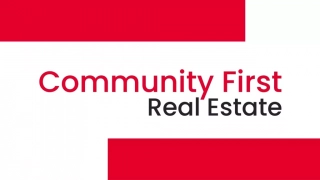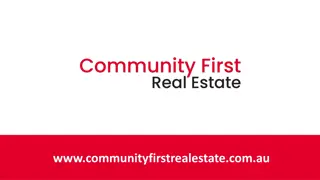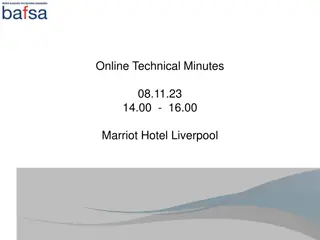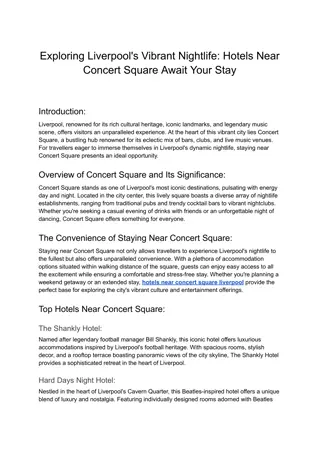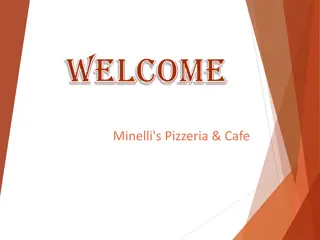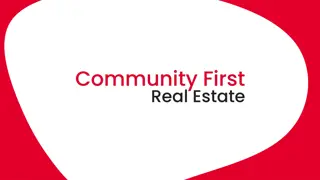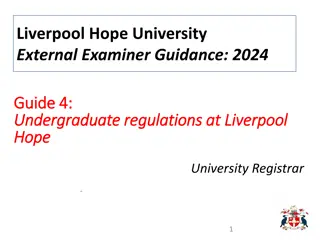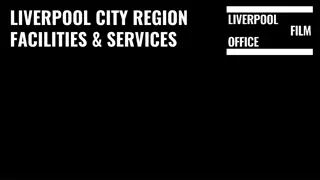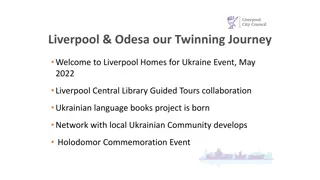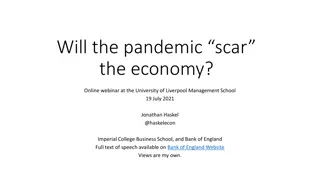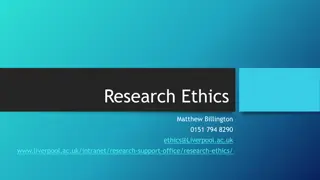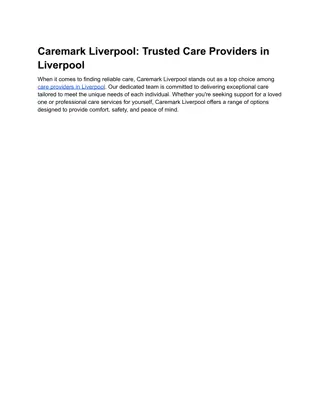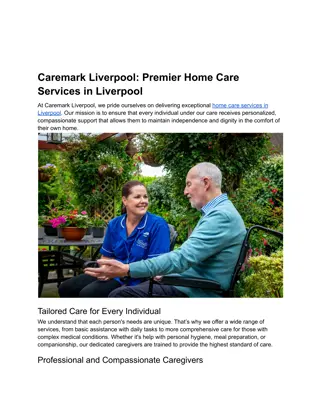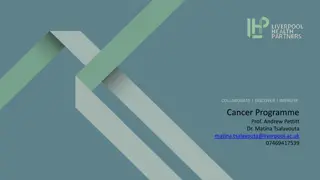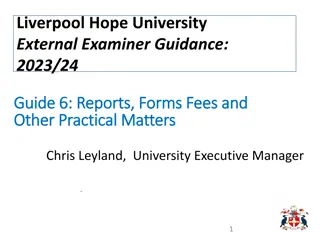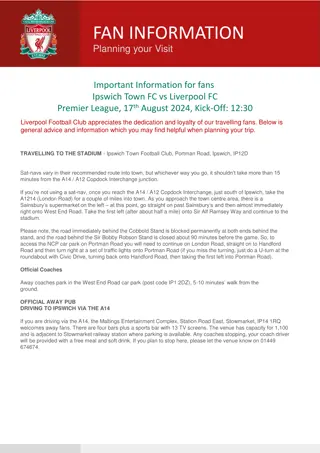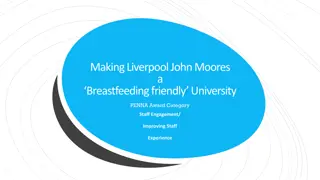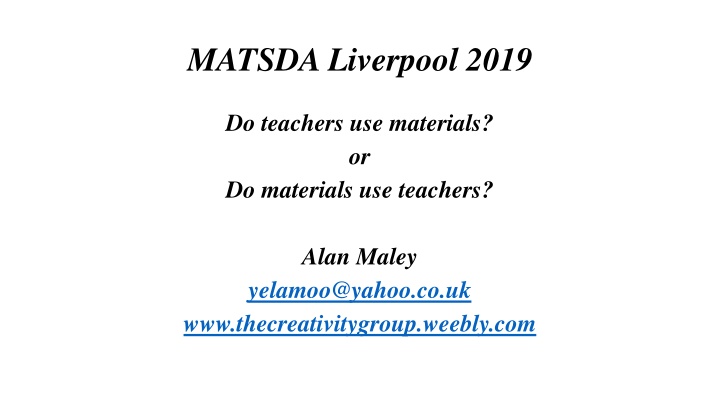
Exploring the Impact of Textbooks on Teaching Approaches and Teacher Empowerment
Delve into the longstanding debate surrounding the use of textbooks in education, as various experts share contrasting views on their benefits and drawbacks. From providing structure and saving time to potentially hindering flexibility and creativity, the role of textbooks in shaping teaching methodologies and empowering educators is scrutinized. Discover the complex dynamics between teaching materials and teachers' autonomy, as well as the implications for student learning and classroom dynamics.
Download Presentation

Please find below an Image/Link to download the presentation.
The content on the website is provided AS IS for your information and personal use only. It may not be sold, licensed, or shared on other websites without obtaining consent from the author. If you encounter any issues during the download, it is possible that the publisher has removed the file from their server.
You are allowed to download the files provided on this website for personal or commercial use, subject to the condition that they are used lawfully. All files are the property of their respective owners.
The content on the website is provided AS IS for your information and personal use only. It may not be sold, licensed, or shared on other websites without obtaining consent from the author.
E N D
Presentation Transcript
MATSDA Liverpool 2019 Do teachers use materials? or Do materials use teachers? Alan Maley yelamoo@yahoo.co.uk www.thecreativitygroup.weebly.com
Havent we been here before? The debate about course-books has been going on for over 30 years. Dick Allwright (1981) What do we want teaching materials for? ELTJ. 36(1) Robert O Neill (1982) Why use textbooks? ELTJ 36 (2)
And guess what37 years on David Dodgson. (2019) 6 Reasons for Using Textbooks (from a teacher who doesn t usually like them) MET, April 2019. Well, what do you know ?
Hooray for textbooks! From Dodgson. They provide structure /organisation (but top down) and security. They have plenty of optional extras. (??) They save time (at the expense of learning?) They have engaging characters and stories. (??) We can work round their limitations, ie. adapt them.
Two cheers for textbooks. From ONeill. Much more nuanced approach. Materials can cater for a wide spectrum of learners common core. Enable Ss to look ahead, and back. Professionally produced, hence saving time and cost. (But note publishers now call the shots, not writers: Zemach 2018) Allow for adaptation and improvisation.
Down with textbooks! Learning effects. Linear (learning is not linear) Constraining content, types of activity, inflexible order, pace/time constraints, etc. One size fits all rarely, if ever, cater to mixed ability Discourage using the spontaneous teachable moment Can become boring/ de-motivating
Down with textbooks! Effects on teachers They pre-empt teacher s power to decide content, activities, order and pace. Over time surrendering this power can become habitual. The claims of habit are too weak to be felt until they are too strong to be broken. (Samuel Johnson) This undermines a teacher s development by teaching them learned helplessness .
Cui Bono? Who gets the benefit? In what sense do materials use teachers? to make money to create dependency by removing uncertainty to shape their thinking Likely that Ts fit learners to materials rather than fit materials to learners ?
So whos right? It all depends on the context and all that which can range from total freedom to decide by the teacher - to total enslavement to prescribed materials. But, even in the most prescriptive contexts, there is usually some wriggle room. And remember, small changes can have big results. (Fanselow, 2018)
Options to make course-books tolerable (apart from burning them) Omit Add Reduce/shorten Extend/ lengthen Re-write/ modify Replace Re-order Branch out (e.g. mini-projects etc.)
Course-books and the wider educational perspective Two Views of Education: People as agents - Rousseau s Emile People as patients - Dicken s Mr Gradgrind
Curing deficiency Releasing ability Conformity/compliance Personalisation/engagement Predictability Unpredictability Planning Improvisation Routine Openness to learning opportunities Risk avoidance Acceptance of risk Coercion Willing cooperation Teaching the subject Teaching the person Which side do textbooks fall on, for you?
Materials as jigsaw puzzle or as musical score? Jigsaw puzzle : only one right way, only one correct outcome. Musical score: interpreted differently each time it is played.
ONeills balanced view. Textbooks can at best provide only a base or a core of materials. They should not aim to be more than that. A great deal of the most important work in class may start with the textbook but end outside it, in improvisation and adaptation, in spontaneous interaction in class, and developing from that interaction. a great deal must depend on spontaneous, creative interaction in the classroom. If that creative interaction does not occur, textbooks are simply pages of dead, inert written symbols and teaching is no more than a symbolic ritual.
Yves Chalon, founder of CRAPEL, Nancy, in Riley 1985. if we don t want to see pedagogy get bogged down in conformity, we have to constantly refuse to conform. The only constructive form of pedagogy is the untamed kind and true pedagogy couldn t give a damn about pedagogy. si on ne veut pas voir la pedagogie s enliser dans le conformisme, il faut qu a tout moment elle enseigne le refus de se conformer. Il n est de pedagogie constructive que sauvage et la vraie pedagogie se moque de la pedagogie.
Thank you for Listening. Alan Maley yelamoo@yahoo.co.uk www.thecreativitygroup.weebly.com
Free downloads of British Council publications: Creativity in the English Language Classroom https://englishagenda.britishcouncil.org/sites/.../f004_elt_creativity_final_v2_web.pdf Integrating Global Issues in the Creative English Language Classroom http://www.teachingenglish.org.uk/article/integrating-global-issues-creative-english- language-classroom
The C Group Creativity for change in Language Education The C Group is an independent and informal grouping of EFL professionals. collaboratively to share information, promote reflection and inquiry, and encourage action through more creative practices. It aims and open teaching More information and membership: http://thecreativitygroup.weebly.com creativity_group@yahoo.co.uk

